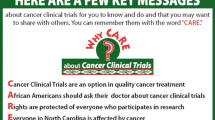Abstract
This paper describes the use of a unique “Learning and Feedbackˮ approach to customize cancer clinical trials education programs for Community Bridges, a peer training intervention designed for African-American communities in North Carolina. Generic community education modules were demonstrated with key community leaders who were designated as trainers. Quantitative and qualitative assessments were provided on understanding of content, comfort with material, and cultural relevance. The generic materials were adapted into three revised modules, all featuring key messages about cancer clinical trials, discussion regarding distrust of medical research, common misconceptions about trials, patient protections, and a call to action to prompt increased inquiry about locally available trials. The revised modules were then used as part of a train-the-trainer program with 12 African-American community leaders. ENACCT’s use of the Learning and Feedback process is an innovative method for culturally adapting clinical trials education.

Similar content being viewed by others
References
Sateren WB, Trimble EL, Abrams J et al (2002) How sociodemographics, presence of oncology specialists, and hospital cancer programs affect accrual to cancer treatment trials. J Clin Oncol 20:2109–2117
Christian MC, Trimble EL (2003) Increasing participation of physicians and patients from underrepresented racial and ethnic groups in National Cancer Institute-sponsored clinical trials. Cancer Epidemiol Biomark Prev 12:277s–283s
Ford JG, Howerton MW, Bolen S et al (2005) Knowledge and access to information on recruitment of underrepresented populations to cancer clinical trials. Summary Evidence Report/Technology Assessment No. 122. AHRQ Publication No. 05-E019-1. Agency for Healthcare Research and Quality, Rockville
Comis RL, Miller JD, Aldigé CR et al (2003) Public attitudes toward participation in cancer clinical trials. J Clin Oncol 21:830–835
Sabe S, Burgher B, Buettner P et al (2011) Attitudes, knowledge and barriers to participation in cancer clinical trials among rural and remote patients. Asia Pac J Clin Oncol 7:27–33. doi:10.1111/j.1743-7563.2010.01342.x
Wallington SF, Luta G, Noone A-M et al (2012) Assessing the awareness of and willingness to participate in cancer clinical trials among immigrant Latinos. J Community Health 37:334–343. doi:10.1007/s10900-011-9450-y
Corbie-Smith G, Thomas SB, St George DMM (2002) Distrust, race, and research. Arch Intern Med 162:2458–2463
Brown M, Moyer A (2010) Predictors of awareness of clinical trials and feelings about the use of medical information for research in a nationally representative US sample. Ethn Health 15:223–236. doi:10.1080/13557851003624281
Wynia MK, Gamble VN (2006) Mistrust among minorities and the trustworthiness of medicine. PLoS Med 3:e244
Wendler D, Kington R, Madans J et al (2006) Are racial and ethnic minorities less willing to participate in health research? PLoS Med 3:e19
Bussey-Jones J, Garrett J, Henderson G et al (2010) The role of race and trust in tissue/blood donation for genetic research. Genet Med 12:116–121. doi:10.1097/GIM.0b013e3181cd6689
Scharff DP, Mathews KJ, Jackson P et al (2010) More than Tuskegee: understanding mistrust about research participation. J Health Care Poor Underserved 21:879–897. doi:10.1353/hpu.0.0323
Markman M, Petersen J, Montgomery R (2008) An examination of the influence of patient race and ethnicity on expressed interest in learning about cancer clinical trials. J Cancer Res Clin Oncol 134:115–118
UyBico SJ, Pavel S, Gross CP (2007) Recruiting vulnerable populations into research: a systematic review of recruitment interventions. J Gen Intern Med 22:852–863
Baquet CR, Patricia Commiskey C, Mullins D et al (2006) Recruitment and participation in clinical trials: socio-demographic, rural/urban, and health care access predictors. Cancer Prev Early Detect 30:24–33
Michaels M, Weiss ES, Guidry JA et al (2012) The promise of community-based advocacy and education efforts for increasing cancer clinical trials accrual. J Cancer Educ 27:67–74. doi:10.1007/s13187-011-0271-6
Ford M, Wahlquist A, Blake R et al (2012) Assessing an intervention to improve clinical trial perceptions among predominately African-American communities in South Carolina. Prog Community Health Partn 6:249–263. doi:10.1353/cpr.2012.0038
Hawkins RP, Kreuter M, Resnicow K et al (2008) Understanding tailoring in communicating about health. Health Educ Res 23:454–466. doi:10.1093/her/cyn004
Merzel C, D’Afflitti J (2003) Reconsidering community-based health promotion: promise, performance, and potential. Am J Public Health 93:557–574
Kincaid DL (2004) From innovation to social norm: bounded normative influence. J Health Commun 9(1):37–57. doi:10.1080/10810730490271511
Kelly JA, St. Lawrence JS, Yvonne Stevenson L et al (1992) Community AIDS/HIV risk reduction: the effects of endorsements by popular people in three cities. Am J Public Health 82:1483–1489
St. Lawrence JS, Brasfield TL, Diaz YE et al (1994) Three-year follow-up of an HIV risk reduction intervention that used popular peers. Am J Public Health 84:2027–2028
Sadler GR, Gonzalez J, Mumman M et al (2010) Adapting a program to inform African American and Hispanic American women about cancer clinical trials. J Cancer Educ 25:142–145. doi:10.1007/s13187-009-0032-y
Schapira L, Schutt R (2011) Training community health workers about cancer clinical trials. J Immigr Minor Health 13:891–898. doi:10.1007/s10903-010-9432-7
Schutt RK, Lidia S, Maniates J et al (2010) Community health workers’ support for cancer clinical trials: description and explanation. J Community Health 35:417–422. doi:10.1007/s10900-010-9267-0
Acknowledgments
This project was supported by a grant from the National Cancer Institute’s (NCI) Center to Reduce Cancer Health Disparities (CRCHD) Community Networks Program (CNP), Grant No U01 CA114629 and the National Center for Minority Health Disparities (NCMHD) No P60-MD000244.
Conflict of Interest
Among the nine authors of this paper, one has a conflict of interest. The first author served as an independent contractor for ENACCT and owns a health and wellness service.
Ethical Standards
The Community Bridges project described in this paper was approved by an appropriate ethics committee and was performed in accordance with the ethical standards as outlined in the 1964 Declaration of Helsinki and its later amendments.
Author information
Authors and Affiliations
Corresponding author
Rights and permissions
About this article
Cite this article
Blakeney, N., Michaels, M., Green, M. et al. Collaborative Development of Clinical Trials Education Programs for African-American Community-Based Organizations. J Canc Educ 30, 400–406 (2015). https://doi.org/10.1007/s13187-014-0673-3
Published:
Issue Date:
DOI: https://doi.org/10.1007/s13187-014-0673-3




